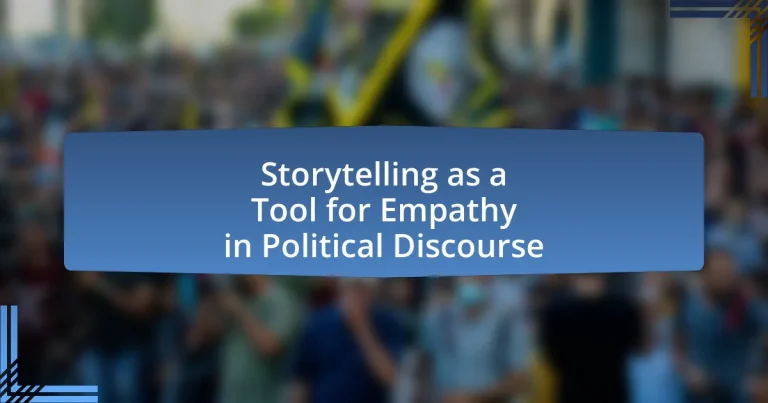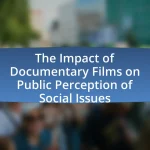Storytelling serves as a vital tool for fostering empathy in political discourse by sharing personal narratives that resonate emotionally with audiences. This article explores how storytelling enhances understanding and compassion for diverse perspectives, highlighting psychological mechanisms such as transportation and emotional resonance that facilitate empathetic engagement. It discusses the importance of narrative structure, the impact of personal anecdotes versus factual narratives, and the role of empathy in reducing polarization and improving communication among differing viewpoints. Additionally, the article addresses the challenges and ethical considerations of using storytelling in politics, offering practical tips for effectively integrating storytelling into political campaigns to connect with constituents.
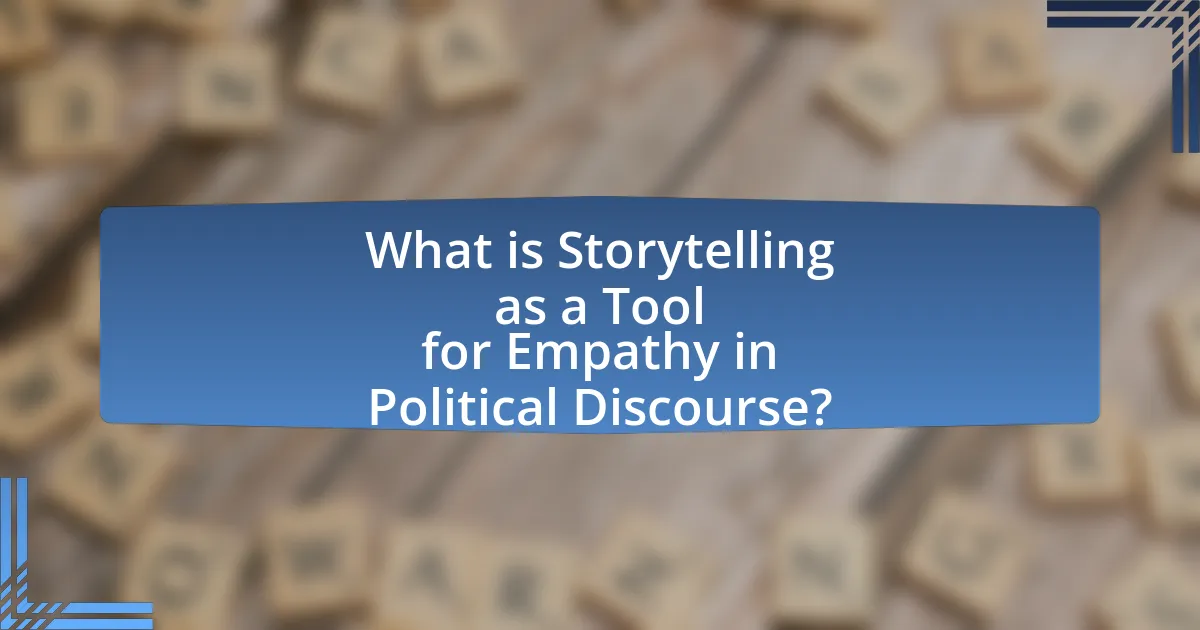
What is Storytelling as a Tool for Empathy in Political Discourse?
Storytelling is a method used in political discourse to foster empathy by sharing personal narratives that resonate emotionally with audiences. This technique allows politicians and advocates to connect with constituents on a human level, making complex political issues more relatable. Research indicates that stories can activate emotional responses in listeners, leading to greater understanding and compassion for differing perspectives. For instance, a study published in the journal “Political Psychology” by Green and Brock (2000) demonstrates that narratives can significantly influence attitudes and beliefs by enhancing emotional engagement. Thus, storytelling serves as a powerful tool for building empathy in political discussions, facilitating deeper connections between individuals and their experiences.
How does storytelling foster empathy in political discussions?
Storytelling fosters empathy in political discussions by allowing individuals to connect emotionally with diverse perspectives. When narratives are shared, they humanize complex issues, making them relatable and accessible. Research indicates that stories activate brain regions associated with empathy, such as the mirror neuron system, which enhances understanding of others’ feelings and experiences. For instance, a study published in the journal “Psychological Science” by Paul Zak found that participants who listened to a compelling story exhibited increased levels of oxytocin, a hormone linked to empathy and social bonding. This biological response underscores how storytelling can bridge divides in political discourse, encouraging listeners to engage with viewpoints different from their own.
What psychological mechanisms are involved in storytelling and empathy?
Storytelling engages psychological mechanisms such as transportation, identification, and emotional resonance, which enhance empathy. Transportation refers to the immersive experience that allows individuals to become absorbed in a narrative, leading to a shift in perspective. Identification occurs when individuals relate to characters or situations, fostering a sense of shared experience. Emotional resonance involves the activation of emotional responses, which can trigger empathetic feelings towards others. Research by Green and Brock (2000) demonstrates that narratives can significantly increase empathy by facilitating these mechanisms, thereby influencing attitudes and behaviors in political discourse.
How does narrative structure influence emotional engagement?
Narrative structure significantly influences emotional engagement by shaping how audiences connect with characters and events. A well-defined structure, such as the classic three-act format, creates tension and resolution, which fosters empathy and emotional investment. For instance, research by Green and Brock (2000) demonstrates that narratives with a clear structure enhance transportation, leading to stronger emotional responses. This structured approach allows audiences to immerse themselves in the story, making them more likely to empathize with the characters’ experiences and perspectives, particularly in political discourse where emotional resonance can drive engagement and understanding.
Why is empathy important in political discourse?
Empathy is important in political discourse because it fosters understanding and connection among individuals with differing viewpoints. When politicians and citizens engage empathetically, they are more likely to listen to each other’s concerns, leading to more constructive dialogue and potential compromise. Research indicates that empathetic communication can reduce polarization; for instance, a study published in the journal “Political Psychology” found that empathy can significantly decrease hostility between opposing political groups. This ability to relate to others’ experiences enhances the quality of discussions and promotes a more inclusive political environment.
What role does empathy play in understanding diverse perspectives?
Empathy is crucial for understanding diverse perspectives as it enables individuals to connect emotionally with others’ experiences and viewpoints. This emotional connection fosters open-mindedness and reduces biases, allowing for a more comprehensive understanding of different cultural, social, and political contexts. Research indicates that empathetic engagement can lead to improved communication and collaboration among diverse groups, as seen in studies highlighting how storytelling in political discourse can bridge divides by humanizing complex issues and fostering shared understanding.
How can empathy reduce polarization in political debates?
Empathy can reduce polarization in political debates by fostering understanding and connection between opposing viewpoints. When individuals engage in empathetic listening, they are more likely to appreciate the experiences and emotions that shape others’ beliefs, which can lead to a decrease in hostility and an increase in constructive dialogue. Research indicates that empathy encourages individuals to consider alternative perspectives, thereby reducing the emotional distance that often fuels polarization. For example, a study published in the journal “Political Psychology” found that participants who practiced empathy were more open to discussing contentious issues and less likely to resort to divisive rhetoric. This demonstrates that empathy not only humanizes political opponents but also creates a foundation for collaborative problem-solving.
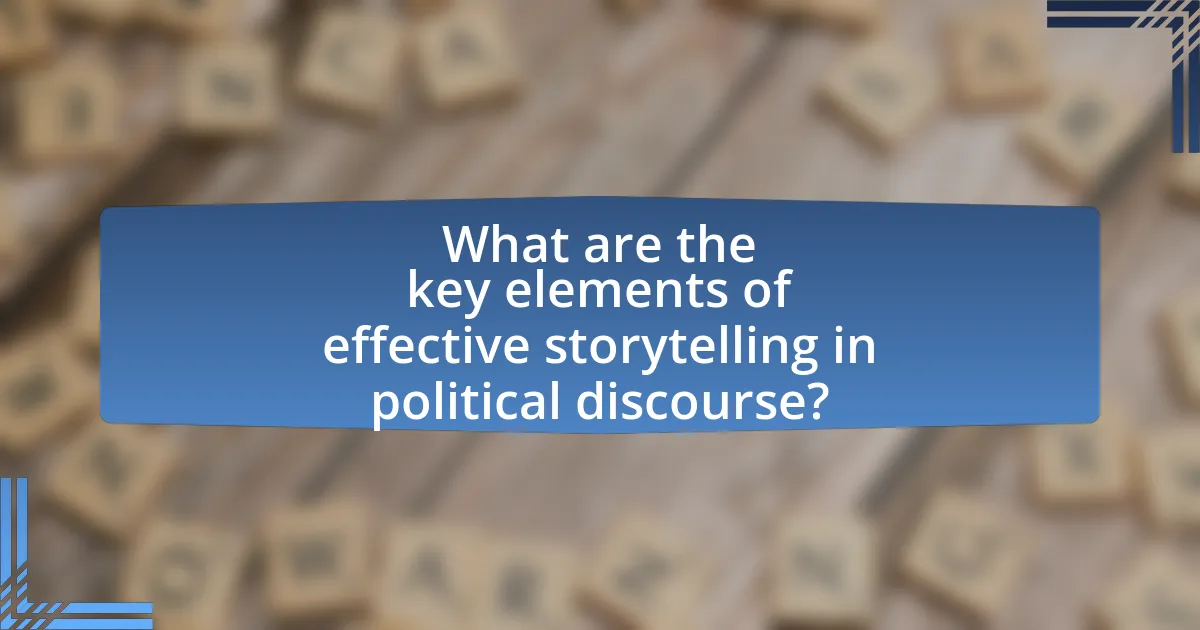
What are the key elements of effective storytelling in political discourse?
The key elements of effective storytelling in political discourse include relatability, emotional engagement, clarity, and a strong narrative structure. Relatability allows the audience to connect with the story on a personal level, making the political message more impactful. Emotional engagement captures the audience’s feelings, fostering empathy and a deeper understanding of the issues presented. Clarity ensures that the message is easily understood, avoiding jargon that could alienate listeners. A strong narrative structure, which typically includes a clear beginning, middle, and end, helps to maintain the audience’s attention and effectively convey the intended message. These elements are supported by research indicating that stories can significantly enhance persuasion and retention of information in political contexts.
What types of stories resonate most with political audiences?
Personal narratives and stories that evoke emotional responses resonate most with political audiences. These types of stories often include personal experiences related to social issues, such as healthcare, immigration, or economic hardship, which create a sense of empathy and connection. Research indicates that emotionally charged narratives can significantly influence political attitudes and behaviors, as they allow audiences to relate to the experiences of others, fostering a deeper understanding of complex issues. For instance, a study published in the journal “Political Psychology” found that personal stories about healthcare experiences can shift public opinion on health policy by humanizing abstract statistics and making the consequences of policies more tangible.
How do personal anecdotes differ from factual narratives in impact?
Personal anecdotes differ from factual narratives in impact primarily through their emotional resonance and relatability. Personal anecdotes evoke empathy by sharing individual experiences, allowing audiences to connect on a personal level, while factual narratives provide objective information that informs but may lack emotional engagement. Research indicates that stories, particularly personal ones, can activate brain regions associated with empathy and emotional processing, making them more memorable and persuasive in political discourse. For instance, a study by Paul Zak found that narratives that include emotional elements can increase oxytocin levels, enhancing feelings of connection and trust among listeners. This demonstrates that personal anecdotes can significantly influence attitudes and behaviors compared to purely factual accounts.
What cultural factors influence storytelling effectiveness?
Cultural factors that influence storytelling effectiveness include shared values, beliefs, and social norms within a community. These elements shape how stories are perceived and interpreted, affecting their emotional resonance and relatability. For instance, a study by the Pew Research Center found that narratives reflecting cultural identity and collective experiences tend to engage audiences more deeply, as they resonate with familiar contexts and shared histories. Additionally, language and communication styles prevalent in a culture can impact the clarity and impact of the story, as seen in various storytelling traditions across different societies.
How can storytelling techniques be applied in political communication?
Storytelling techniques can be applied in political communication by creating relatable narratives that resonate emotionally with the audience. These narratives often include personal anecdotes, character development, and conflict resolution, which help to humanize political issues and foster empathy. For instance, politicians who share personal stories about their experiences with healthcare or education can illustrate the impact of policies on real lives, making abstract concepts more tangible. Research shows that emotional engagement through storytelling can significantly enhance message retention and influence public opinion, as evidenced by studies indicating that narratives can increase voter turnout by making individuals feel more connected to the political process.
What are the best practices for crafting a compelling political narrative?
The best practices for crafting a compelling political narrative include establishing a clear and relatable message, using emotional storytelling, and incorporating authentic personal experiences. A clear message ensures that the audience understands the core values and goals of the narrative, while emotional storytelling engages the audience on a deeper level, making the message more memorable. Authentic personal experiences add credibility and foster a connection between the speaker and the audience, enhancing empathy. Research indicates that narratives that evoke emotions can significantly influence public opinion and voter behavior, as demonstrated in studies by the Pew Research Center, which found that emotionally charged stories are more likely to be shared and discussed among individuals.
How can politicians use storytelling to connect with constituents?
Politicians can use storytelling to connect with constituents by sharing relatable narratives that resonate with their experiences and emotions. This approach humanizes political figures, making them more approachable and trustworthy. For instance, a politician discussing their personal struggles or community challenges can evoke empathy and foster a sense of shared identity among constituents. Research indicates that stories activate emotional responses in the brain, which can lead to increased engagement and support; a study published in the journal “Psychological Science” found that narratives can enhance persuasion by creating emotional connections. By effectively utilizing storytelling, politicians can bridge the gap between themselves and their constituents, ultimately strengthening democratic engagement.
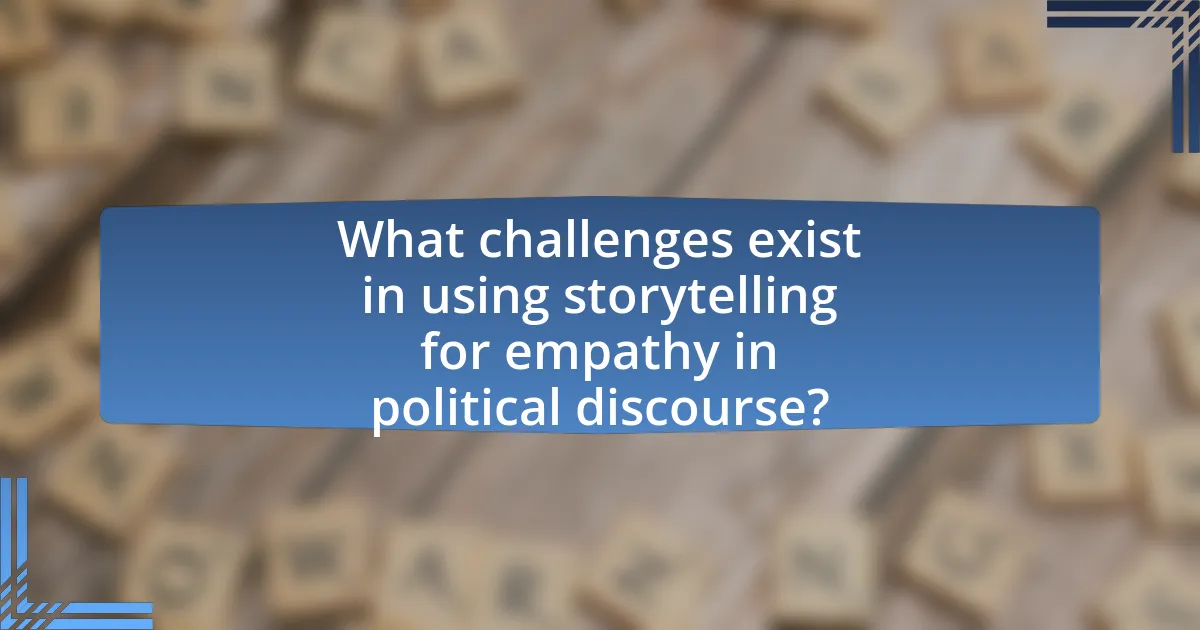
What challenges exist in using storytelling for empathy in political discourse?
Using storytelling for empathy in political discourse faces several challenges, including the risk of oversimplification, potential bias, and the difficulty of reaching diverse audiences. Oversimplification occurs when complex political issues are reduced to simplistic narratives, which can misrepresent the realities of those issues. Bias can emerge when stories are selectively chosen to evoke specific emotional responses, leading to a skewed understanding of the political landscape. Additionally, diverse audiences may interpret stories differently based on their own experiences and backgrounds, making it challenging to foster a shared sense of empathy. These challenges highlight the need for careful consideration in the use of storytelling as a tool for empathy in political discourse.
What are the potential pitfalls of storytelling in politics?
The potential pitfalls of storytelling in politics include oversimplification, manipulation of facts, and the risk of alienating certain audiences. Oversimplification occurs when complex political issues are reduced to simplistic narratives, leading to misunderstandings and misinformed public opinions. Manipulation of facts can happen when politicians selectively use stories to distort reality, thereby misleading constituents. Additionally, storytelling may alienate specific groups if narratives do not resonate with their experiences or values, potentially deepening societal divides. For example, during the 2016 U.S. presidential election, narratives that emphasized certain demographics while neglecting others contributed to polarization among voters.
How can misinterpretation of stories lead to misinformation?
Misinterpretation of stories can lead to misinformation by distorting the original message and context, resulting in false narratives. When individuals or groups interpret a story through their biases or preconceived notions, they may emphasize certain elements while neglecting others, which can alter the intended meaning. For example, a study by the Pew Research Center found that 64% of Americans believe that news stories often misrepresent facts, highlighting how misinterpretation can contribute to widespread misinformation. This distortion can perpetuate stereotypes, fuel division, and misguide public opinion, ultimately undermining informed discourse in political contexts.
What ethical considerations should be taken into account?
Ethical considerations in storytelling as a tool for empathy in political discourse include accuracy, representation, and the potential for manipulation. Accuracy is crucial, as misrepresenting facts can lead to misinformation and erode trust. Representation involves ensuring diverse voices and perspectives are included, preventing marginalization of certain groups. The potential for manipulation arises when stories are crafted to evoke emotional responses without a basis in truth, which can distort public perception and influence political outcomes. These considerations are essential to maintain integrity and foster genuine understanding in political communication.
How can storytelling be effectively integrated into political campaigns?
Storytelling can be effectively integrated into political campaigns by creating relatable narratives that resonate with voters’ experiences and emotions. This approach allows candidates to humanize their platforms, making complex issues more accessible and engaging. For instance, using personal anecdotes or testimonials can illustrate policy impacts on real lives, fostering a deeper connection with the audience. Research indicates that narratives can enhance message retention and persuasion; a study by the University of Pennsylvania found that stories are 22 times more memorable than facts alone. By leveraging storytelling, campaigns can evoke empathy, drive engagement, and ultimately influence voter behavior.
What strategies can enhance the impact of storytelling in campaign messaging?
Utilizing relatable characters and authentic narratives can significantly enhance the impact of storytelling in campaign messaging. By creating characters that resonate with the audience’s experiences, campaigns can foster emotional connections, making the message more memorable. Research indicates that stories featuring relatable protagonists can increase engagement by up to 50%, as they allow audiences to see themselves in the narrative, thereby deepening empathy and understanding. Additionally, incorporating real-life testimonials and experiences adds credibility, as audiences are more likely to trust messages that reflect genuine human experiences. This strategy not only amplifies the emotional weight of the campaign but also encourages audience participation and sharing, further extending the reach and effectiveness of the messaging.
How can feedback from audiences shape storytelling approaches?
Feedback from audiences can significantly shape storytelling approaches by providing insights into emotional resonance and engagement levels. When creators analyze audience reactions, they can identify which narratives evoke empathy and which do not, allowing for adjustments that enhance emotional impact. For instance, studies have shown that audience feedback can lead to the refinement of character development and plot structure, making stories more relatable and impactful. This iterative process ensures that storytelling evolves in response to audience needs, ultimately fostering a deeper connection between the narrative and its audience.
What practical tips can enhance storytelling for empathy in political discourse?
To enhance storytelling for empathy in political discourse, one practical tip is to incorporate personal narratives that reflect diverse experiences. Personal stories humanize complex issues, making them relatable and fostering emotional connections. Research indicates that narratives can significantly influence attitudes and perceptions; for instance, a study by Green and Brock (2000) found that individuals who engage with narrative transportation are more likely to change their beliefs. Additionally, using vivid imagery and descriptive language can evoke emotions, further deepening the audience’s empathy. By focusing on shared values and common goals within these stories, communicators can bridge divides and promote understanding among differing political viewpoints.
